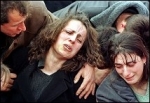23 February 2006
Kosovo Bishop Warns Not to Hand Jihadists a Victory
 A leading Serbian Orthodox bishop, visiting the U.S. on a mission of "peace and understanding," has warned the international community against
A leading Serbian Orthodox bishop, visiting the U.S. on a mission of "peace and understanding," has warned the international community against
granting independence to Kosovo, saying such a move would hand a victory to radical Muslims and their jihadist supporters.
Kosovo's independence from Serbia would also mean "a virtual sentence of extinction" for minority Serbs in the province, according to Dr. Artemije Radosavljevic, the bishop of the Serbian cities of Raska and Prizren.
He met with Cybercast News Service during a recent 20-day tour of the U.S. to discuss the fate of the troubled province, which is formally known as Kosovo and Metohija. This month, international talks are set to begin regarding Kosovo's final status.
Kosovo, which is part of the sovereign country of Serbia and Montenegro, has been a U.N. protectorate since North Atlantic Treaty Organization (NATO) forces bombed Yugoslavia between March and May of 1999 to compel the Serb-dominated government of Slobodan Milosovic to withdraw its forces from Kosovo.
The NATO bombings were launched in response to an alleged genocide being conducted against Kosovar Albanians by the Serbs. But when the bombing campaign ended, ethnic cleansing allegedly took place with Albanians, who are predominantly Muslim, targeting Christian Serbs and other minorities such as Turks, Roma (gypsies), Ashkali and Muslim Slavs.
The violence, including rape, murder, torture and the burning of villages, was witnessed and documented in hundreds of pages of United Nations (U.N.), NATO Kosovo Force (KFOR) and Organization for Security and Co-operation in Europe (OSCE) documents.
"Detaching Kosovo from democratic Serbia would mean a virtual sentence of extinction for my people in the province -- the larger part of my diocese -- who continue to face unremitting violence from jihad terrorist and criminal elements that dominate the Albanian Muslim leadership," Dr. Artemije said.
The ethnic cleansing that followed the NATO campaign has prompted an exodus of approximately 240,000 Serbs and minorities from the region.
Arguing that a "pure mono-ethnic and mono-religious Kosovo" could result from independence, the bishop said the move would "definitely be used to strengthen what we call the 'white al Qaeda,'" a reference to the recruitment of terrorists with European features.
"This [al Qaeda] would definitely be in grave contest and even more dangerous that the one we know so far from bin Laden ... because they could very [easily] melt within other populations ... ." Granting independence would be a "tragedy," he said.
Dr. Artemije also referred to allegations made by Thomas Gambill, a former OSCE security chief, who previously told Cybercast News Service that Kosovo is a lawless region "owned" by the Albanian mafia, characterized by continuing ethnic cleansing and subject to increasing infiltration by al Qaeda-linked Muslim jihadists.
Gambill's remarks were confirmed in official documents and by a United Nations official who spoke on condition of anonymity.
"In our past visits here, we did indicate and tried to provide information sufficient to show there's a lot of evidence about the terror and the mafia taking stronghold in Kosovo," Dr. Artemije said. "We are worried this truth has not been accepted or did not go any further ... We have faith that in the future this truth will be known, unfortunately, we are afraid it might be too late for the Christians in Kosovo."
The Serbian bishop described the life of Serbs and other minorities in Kosovo as "extremely difficult."
"Basic civil rights are completely non-existent. Their security of their own life doesn't exist. Any assistance regarding schools or health care, etcetera, is very meager ... ," he said.
Before NATO's bombing campaign, then-President Bill Clinton estimated publicly that 100,000 ethnic Albanians had been killed. Within weeks of NATO's bombing campaign, however, the estimate was greatly revised downward. A subsequent five-month U.N. investigation found 2,108 bodies and, several months after the NATO mission, USA Today reported that the figures appeared to have been "greatly exaggerated." See Video.
Andrew Bacevich, professor of International Relations at Boston University, told USA Today that in order to justify the NATO bombings, "they needed to tap that memory of the Holocaust."
Recent reports reviewed by Cybercast News Service indicate that in 1999, slightly more than 4,000 Albanians were killed and approximately 1,700 non-Albanians were killed. Some 2,500 are still missing, according to data from the Commission for Abducted and Missing Persons.
Cybercast News Service asked Bishop Artemije whether he believed allegations that President Clinton had exaggerated the figures in order to generate support for the war.
"I couldn't say that he was the one who was lying, but definitely he was getting or using false information," the bishop stated. "... It seems to us it was important to fabricate these figures in order to justify and prepare the intervention of NATO in Kosovo."
Diplomats and analysts critical of the situation in Kosovo have told Cybercast News Service that the religious persecution is part of a political strategy of violence, which if successful in winning the independence of Kosovo, could trigger similar violent secessionist movements throughout neighboring states and countries.
Those same officials also express concern about radical Islamic elements existing on Europe's doorstep, in a province already plagued with illegal arms and narcotics trafficking.
Bishop Artemije's remarks to Cybercast News Service were translated by his Washington, D.C., representative.
19:00 Posted in EUROPE | Permalink | Comments (0) | ![]() Facebook |
Facebook |



















The comments are closed.